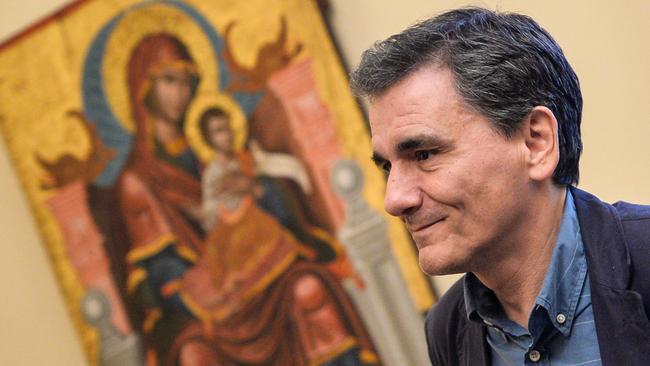The world’s toughest gig? Euclid Tsakalotos now has the impossible job of fixing Greece
THE man who must now lead Greece’s negotiations with furious European leaders has admitted a severe case of “stage fright”. We don’t blame him.

HE’S the man who could have the toughest job in the world right now.
Newly appointed Greek Finance Minister Euclid Tsakalotos, who stepped in to replace the controversial Yanis Varoufakis yesterday, must somehow negotiate a deal with Europe after the Greek people overwhelmingly rejected tough bailout conditions in Sunday’s referendum.
Mr Varoufakis announced his resignation yesterday in a bizarre posting on his personal blog, ostensibly to facilitate the negotiations.
“I was made aware of a certain preference by some Eurogroup participants, and assorted ‘partners’, for my ... ‘absence’ from its meetings,” wrote Mr Varoufakis, who had often clashed with creditors in negotiations over the past months.
Upon taking office on Monday, Mr Tsakalotos, an Oxford-educated leftist economist, said Greeks had declared in the referendum that they “deserve better” and “cannot accept a non-viable solution” to the country’s debt crisis.
• HELP FOR THE FACE OF GREECE’S DESPAIR
• GERMANY WANTS ‘CREDIBLE’ PROPOSALS
• YANIS VAROUFAKIS RESIGNS IN BLOG POST
• THE DANGEROUS PATH GREECE HAS CHOSEN
• THE ‘AMATEUR’ WHO COULD DESTROY EUROPE
The 55-year-old, who was previously Deputy Foreign Minister, had already been taking the lead in Greece’s bailout talks since April after Mr Varoufakis was sidelined for his antagonistic style which was said to infuriate creditors.
Tsakalotos is far less abrasive than Varoufakis but no less determined to secure a deal compatible with the hard-left government’s agenda. He has already formed relationships with key figures including European Central Bank chief Mario Draghi.
“We want to continue the discussion. I believe something can change in Europe,” said a shaken Tsakalotos, who admitted to having “stage fright” upon assuming the post at “not at the easiest moment in Greek history”.


“We want to take [Sunday’s referendum] mandate from the Greek people for something better for the working people, for the people suffering, for those who lost their jobs, who saw their pensions reduced, for the youths who went abroad,” the new minister said.
“The Greek people proved they were not afraid and are not looking out just for themselves. This government will do the same in the coming period.”
The Guardian describes Mr Tsakalotos as Athens’ “secret weapon” whose experience “engaging critically” with neoclassical economic thinking and privileged Oxford and private school education makes him well prepared to run negotiations.
“The fact that he also sounds like an aristocrat helps too,” a Syriza insider told The Guardian. “He speaks their language better than they do. At times it’s been quite amusing to watch.”
While some have welcomed the change, others are sceptical that Mr Tsakalotos will be willing to concede any more ground than his predecessor on further austerity measures.
Bloomberg News said he would be a “change of style, if not necessarily of substance”, given his staunch support of Syriza’s anti-austerity policies.
“I don’t expect Tsakalotos’s appointment to lead to a significant change in Greece’s policies but his less confrontational approach should definitely help negotiations,” said Diego Iscaro, an economist at research group IHS Inc, told Bloomberg.
Others have pointed to his recent book, co-authored with economist Christos Laskos, titled The Crucible of Resistance: Greece, the eurozone and the World Economic Crisis, in which he criticises “permanent austerity” and urges other European countries to emulate Syriza’s model.
“By alienating an entire nation of people, the Troika has revealed the internal contradictions of the modern neoliberal establishment, as well as the inadequacies of the earlier social-democratic Keynesian regime,” the book’s description reads.
“Tsakalotos and Laskos suggest that there is very little that differentiates Greece from other countries struggling under austerity, and that parties such as Syriza could usher in a new, democratic and socialist era across the continent.”



